Free Living Bee Project
Lost Gardens of Heligan
Simon Kellam - Trustee - The Natural Beekeeping Trust
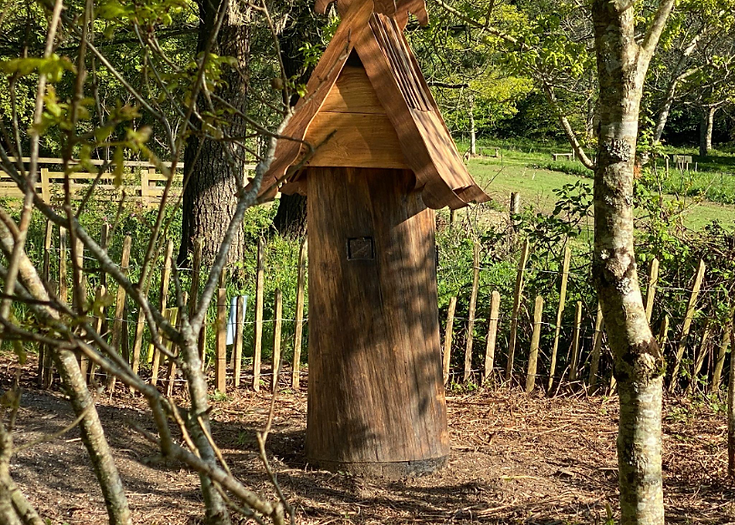
Latvian Log Hive

Introduction
The mention of honeybees often draws people's attention, almost as if some kind of inner connection exists. Unfortunately, many believe these honeybees live in boxes on the ground managed by beekeepers running around in funny white suits. In reality, a honeybee's natural habitat is far removed from this.
Education plays an important role in changing this commonly held perception. The NBKT is very fortunate to be collaborating with one of Cornwall's top visitor attractions, the Lost Gardens of Heligan, UK. to help achieve this goal.
The Lost Gardens of Heligan are steeped in history. The Cornish Tremayne family created the diverse 200-acre estate in the mid-18th century. After being left to the course of nature at the outbreak of WW1, it was only re-awakened in the 1990s to become one of Europe's largest garden restoration projects, headed by Tim Smitt founder of the Eden Project.

Bee Boles - Lost Gardens of Heligan
The gardens are very diverse, ranging from farmland, productive flower and vegetable gardens, a wild area filled with subtropical tree ferns known as "The Jungle" and Europe's only remaining pineapple pit, warmed by rotting manure.
For the past thirty years, Heligan’s mantra has been the restoration of the lost: a lost variety of pea; a lost breed of sheep; a lost sense of connection with nature… understanding the past and looking to the future. It is Heligan’s restorative pulse that makes it such a natural space for investigating regenerative farming.
An abundance of diverse forage also provides the perfect place for the honeybee. The local Roseland Beekeeping Group already has a small apiary in the apple orchard, managed for a number of years with a bee-centered approach. Heligan has also been one of the bases for the B4 project whose aims are to conserve and protect the local Cornish Black bee.

Roseland Bee Group Log Hive
In 2019, I met Jonathan Powell at a Natural Beekeeping Trust (NBKT) log hive workshop in Devon. This was to be a defining moment in my beekeeping journey, raising numerous questions about modern-day beekeeping methods. It didn't take long for me to rally some members of the Roseland Bee Group together to create our own log hive at Heligan Gardens, to help encourage free-living bees.

In 2022 I was asked to install 2 Eco Tree Hives to further promote free-living bees at Heligan Gardens, and to enhance the visitor's experience to the gardens
Eco Tree Hive
In April 2023 the NBKT hosted the ‘Learning From the Bees’ conference at the Sheepdrove, Hungerford, UK. Among many of the international delegates attending were a few representatives from Latvia who transported over with them a couple of traditional Latvian Log Hives.
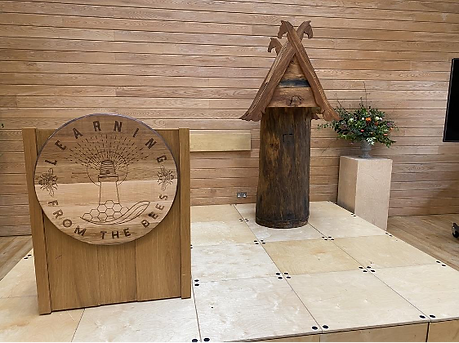
LFTB Conference
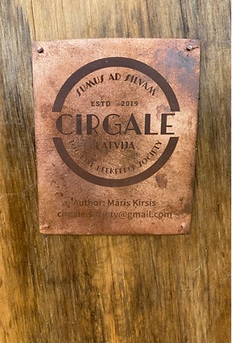
In Latvia and the Baltic regions, the tradition of providing honeybees with log hives spans more than a thousand years. This particular log hive was crafted by log hive master ‘Austra’ Maris Kirsis from the Cirgale Society of Latvia.
This log hive was kindly donated to the NBKT. A suitable place was needed to make the most of this amazing bee habitat. The Lost Gardens of Heligan was the prime choice of location, with its idyllic settings and a 300,000 annual footfall of visitors.
The original Bee Observation hut situated in the gardens was run down and in need of a facelift. It previously housed in a conventional WBC hive with a big glass window to facilitate visitor observation. It was an inappropriate bee habitat that witnessed the demise of a number of colonies.
This gift to the bees will allow the bees to live and thrive and at the same time create a memorable visitor attraction.
As a natural progression of this project, a number of other events have evolved at Heligan Gardens this summer:
Event #1
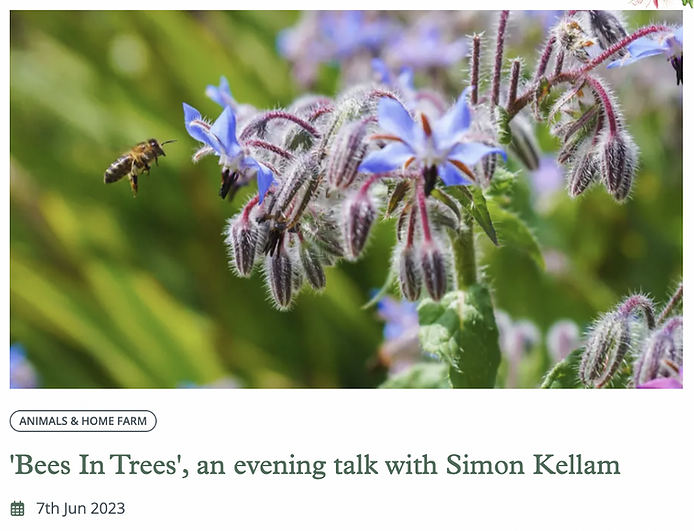
Report by Clare Harwood
Bees, trees, and cocktails were all part of an enlightening and captivating talk at The Lost Gardens of Heligan on 7th June, where Simon Kellam of Just Bee Eco Hives shared his insights on free-living bees and bee-centered beekeeping. The talk, titled ‘Bees In Trees’, attracted more than 30 attendees, both beekeepers and non-beekeepers, who enjoyed lavender infused cocktails, tea, coffee, and delicious cake before diving into the fascinating topic of bees and their natural habitat in tree cavities.
Simon recounted his personal journey of how he merged his two passions, bees, and woodwork, into a unique path as an advocate for free-living bees and developing his own tree hives to create natural spaces for wild colonies of honeybees. His ‘eureka’ moment was when he realised, that, by researching and rehoming wild honeybees he felt more connected to the bees themselves. Simon’s journey was fascinating to hear. From practicing mainstream beekeeping to camping in the Naliboki Forest in Belarus learning to make traditional log hives. You can view the impressive Latvian log hive recently installed at Heligan, through the bee observation hut.
Simon’s presentation covered the benefits of tree cavities for wild honeybees, the history of tree beekeeping, and his eco beehive project. He showed how tree cavities help bees maintain a more natural balance with the pollinator community, and how to report wild colonies on freelivingbees.com. He also talked about a brotherhood of beekeepers known as, Zeidlers, who kept bees in trees before the industrial revolution. Finally, it was fascinating to hear more about Simon’s project of installing 80 log hives with a 90% success rate. For more details on Simon’s work, and to sign up for his newsletter to hear about upcoming talks and workshops, visit: justbeeecohives.com
The evening was packed full of information that left us wanting to dig a little deeper and learn more. There were plenty of opportunities to ask questions and mull over our own beekeeping practices. I’d encourage anyone interested in this subject to keep an eye out for future events with Simon. Thank you, Simon, for a great evening, and thank you to Toby Davies, Wildlife Co-ordinator at Heligan Gardens, for his continued support and knowledge in assisting and hosting these events.

Event #2
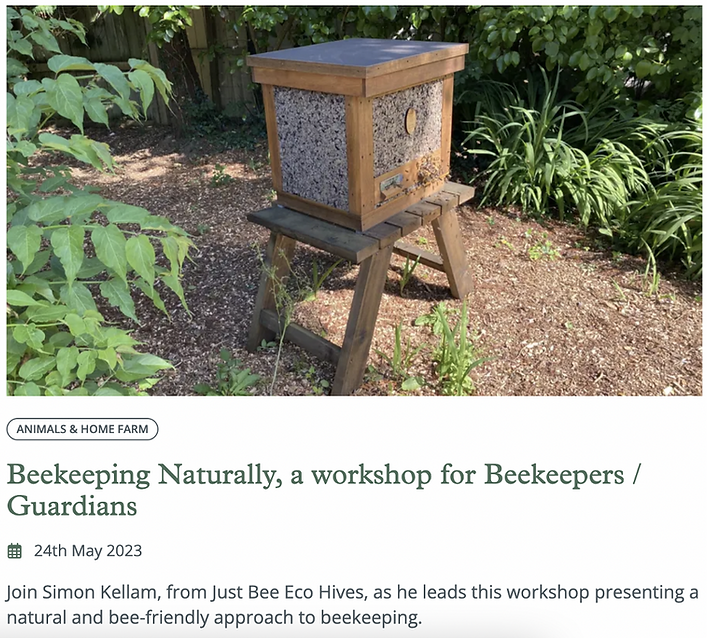
Report by Clare Harwood
On a sunny spring day in May, Heligan Gardens in Cornwall was the perfect venue for Simon Kellam’s Beekeeping Naturally workshop. Simon is an expert in natural beekeeping, or as he prefers to call it, bee centered apiculture. He shared his insights and experience with a group of enthusiastic beekeepers of all levels, who wanted to learn how to care for bees in a more natural, and bee centered way.
The workshop was a great mix of theory and outdoor observation, where Simon explained the benefits of natural environments for bees, such as tree cavities, and how we can mimic them in our own hives. He also covered topics such as sourcing local bees, letting bees build their own comb, allowing swarming, avoiding medical treatments and sugar feeding, and harvesting less honey.
Throughout the day we enjoyed delicious tea, coffee and cake, and had plenty of opportunities to ask questions and share our thoughts either in the classroom or while strolling through the gardens.
As part of the workshop, we were able to observe a wild colony of bees in a beech tree, and a recently installed Latvian Log Hive that was being scouted by some curious bees. Simon also opened one of the Eco Tree hives to show us the hexagonal floor design and marvel at the calm and thriving colony inside.
In the afternoon, Simon introduced us to some other bee centered hive designs, such as the Sun Hive, the Warre Hive, and as his own design of the Layen Hive, and Hex Hive. He showed us how we could adapt our existing equipment to create more suitable habitats for our bees and emphasised the importance of minimising disturbance and intervention in the brood nest, explaining how it affects the health and well-being of the bees.
Simon’s workshop was a fantastic learning experience for anyone interested in natural beekeeping. He was very knowledgeable, friendly, and helpful, and catered to each participant’s level of experience and situation and inspired us to rethink our relationship with bees and to support them as nature intended.
The workshop was so popular that it sold out quickly, as did the second one on 5th July. Hopefully, Simon will offer more workshops in the future. I highly recommend them to anyone who wants to learn more about bee centered apiculture. A portion of the ticket sales from the events will be donated to the Natural Beekeeping Trust.


